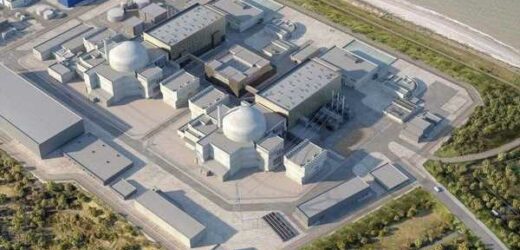Sizewell C nuclear plant confirmed with £700m public stake
We use your sign-up to provide content in ways you’ve consented to and to improve our understanding of you. This may include adverts from us and 3rd parties based on our understanding. You can unsubscribe at any time. More info
Experts have issued a dire warning about the proposed Sizewell C nuclear power plant, as climate change induced flooding could mean that in future, the coastal nuclear site could turn into an island. Earlier this week, the Government confirmed that £700million of public money will be invested power plant, which once built will provide power to the equivalent of six million homes for more than 50 years. However, experts fear that the reactor, which will be built in Suffolk, could be at risk of climate change, as rising sea levels threaten to erode and swallow up the East coast of the UK, Express.co.uk was told.
Earlier this week, the UK’s former Chief Scientific Advisor Sir David King warned that the new £20billion power plant would be “very difficult to protect from flooding” due to rising sea levels on the Suffolk Coast.
Speaking to LBC, he said: “Part of the British coast that’s most at risk of rising sea level is the east coast and clearly this is very close to the oceans as is Sizewell B, and frankly that is the biggest risk.
“It would be very very useful if we could see published an analysis of sea level to the end of the lifespan of Sizewell C. It would take us to 2070 and beyond, possibly 2080.
“I do fear that it’s quite possible that we will have had a one-metre sea level rise by that time, by which time this would be very difficult to protect from flooding. I’m not saying it’s impossible, but I would love to see the safety analysis on the basis of rising sea levels.”


Dr Paul Dorfman, an associate fellow from the Science Policy Research Unit at the University of Sussex told Express.co.uk: “In 2008, the pro-nuclear group of the Institute of Mechanical Engineers published a report, which says that UK nuclear coastal installations, which specify Sizewell, will be subject to storm surge, climate-induced sea level rise, flooding and potential nuclear islanding.
“Perhaps alarmingly, IME point out that these UK coastal nuclear sites will need considerable investment to protect them against rising sea levels, and even relocation or abandonment
“Our knowledge about climate now is that rare events then, become the norm today, so basically there are questions of Sizewell being at significant risk. So quite literally, Sizewell is at the frontline of climate change, and not in a good way.”
He also noted that very “reasonable models” of climate change showed that Sizewell within two decades, would be surrounded by flood water once a year.


He said: “If construction goes ahead, clearly they will build in defences. But the idea of a nuclear power plant within a couple of decades being almost entirely cut off by water, and what does that mean for the future.
“Because it’s not just the reactors, it’s also the high-level spent fuel points, and the hot intermediate-level waste stores that are also at risk.”
As part of its energy strategy unveiled in April, which heavily focused on a number of policies that could help weaken Russia’s grip on UK energy prices, the Government set a target of significantly scaling up nuclear so that it will account for 25 percent of the country’s projected electricity demand by 2040.
The strategy noted that Sizewell C is critically important for helping the UK reach its nuclear targets, and it has been engaging in negotiations regarding the project’s construction since January 2021.
DON’T MISS:
Heat pump warning as EDF urges Britons to take crucial step first [REVEAL]
COVID-19 lab leak theory blown wide open as email chain exposed [REPORT]
Should Rishi Sunak U-turn on onshore wind farms ban? POLL [POLL]

However, Dr Dorfman added: “The other thing is, BEIS, in a statement to Parliament, state that nuclear construction can take 13-17 years. If Sizewell C gets the go-ahead next year at the earliest, we’re looking at first generation by 2040.
Meanwhile, Alison Downes, from the campaign group Stop Sizewell C told Express.co.uk: ““Future flood risk maps show the Sizewell site as an island, and we’re deeply concerned that planning assessments were not conservative enough in considering the potential for coastal erosion in Sizewell Bay.
“EDF is being forced to plan sea defences the height of 3 double-decker buses, but since this site will carry radioactive material for well over a century, is it a safe and sustainable approach to protecting our children’s future to locate a nuclear power station here? We say no.”
Source: Read Full Article


